Is olive oil a seed oil? An In Depth Analysis
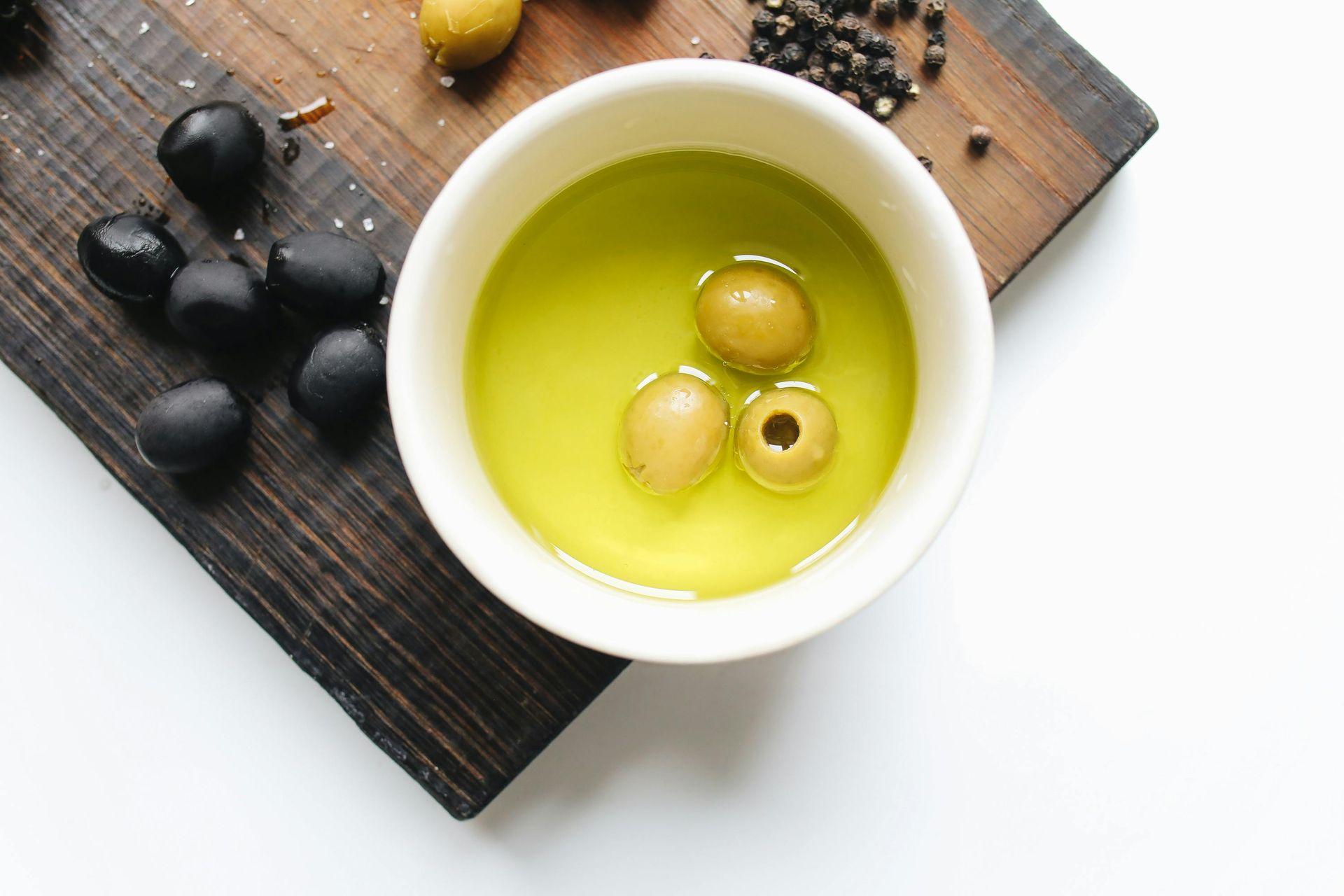
Many people consider olive oil a top choice for cooking. But is it really like other seed oils? In this article, we look into whether olive oil is a seed oil. We'll discuss its characteristics, benefits, and where it comes from. Join us as we discover more about olive oil, a go-to in the kitchen.
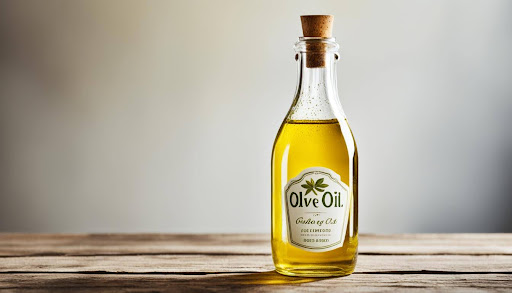
Key Takeaways:
- Understanding the botanical origins of olive oil
- Comparing olive oil to other seed oils
- Exploring the nutritional benefits of olive oil
- Incorporating olive oil into a balanced diet
- Analyzing the health impacts of olive oil and seed oil
The Definition and Classification of Olive Oil
Let's understand what olive oil is and how it's different from other vegetable oils. We will see what makes olive oil unique and where it comes from. We'll learn how olive oil is made from the fruits of olive trees.
What Is Olive Oil?
Olive oil comes from the fruit of the olive tree, called Olea europaea. People have used it for cooking for ages, especially in the Mediterranean. It's loved for its special taste, nice smell, and good for your health points.
How Olive Oil Differs from Seed Oils
Olive oil and seed oils are both vegetable oils but come from different parts of plants. Seed oils are from seeds like sunflower, soybean, or canola. Olive oil comes from the olive tree’s fruit.
One big difference is what they're made of. Most olive oil is a type of healthy fat called monounsaturated fats. Seed oils have more of a different kind called polyunsaturated fats.
Olive Oil's Botanical Origins
Olive oil's story starts with the olive tree in the Mediterranean. The oil is made by squeezing or spinning the olive fruits. This way, the oil keeps its special flavors, smells, and good things for your health.
Where and which type of olives are used can change the oil's taste and quality. Whether it's from Italy, Spain, or Greece, you'll taste different flavors. This is because of the different weather, soil, and types of olives.
Understanding the Basic Differences: Olive Oil vs. Seed Oil
When it's time to pick out cooking oil, many options sit on the shelf. Olive oil and seed oil are favorites, with distinct features. Let's look into what sets olive oil and seed oil apart, diving into their unique traits.
Olive Oil: Olive oil comes from the olive tree's fruit. It's key in Mediterranean meals, bringing a rich flavor. This oil is packed with good monounsaturated fats. Plus, antioxidants and anti-inflammatory stuff are in it too.
Seed Oil: Seed oil is from plants like sunflower, canola, and soybean. It’s lighter in taste than olive oil and has a higher heat point. That’s why it’s great for frying. Although, its health perks might change based on the seed.
Let’s get into what makes olive oil and seed oil different:
- Botanical Origins: Olive oil comes from the olive tree’s fruit, while seed oil is from various plant seeds.
- Composition: Olive oil is mainly made up of heart-healthy monounsaturated fats. Seed oils might have different fats based on the seed type.
- Flavor: Olive oil’s flavor is unique, adding fruitiness or a peppery kick. Seed oils are more neutral and work well in all sorts of dishes.
- Smoke Point: Olive oil smokes at lower temps than seed oils. Seed oils can handle high heats better.
- Health Benefits: Olive oil is linked to many health wins, from heart health to brain support. Seed oils have their own nutritional benefits to offer.
Knowing these details helps choose the right oil for cooking. Whether you love the rich taste of olive oil or need something for high-heat cooking, both olive and seed oils have their place in the kitchen.
Is Olive Oil a Seed Oil?
We dive into whether olive oil fits as a seed oil. First, we'll look at how olive oil and seed oil are made to see the differences. We'll also check the part of the olive fruit in making olive oil.
Next, we will talk about what makes olive oil different from seed oils nutritionally. We aim to give you a complete view. By the end, you should know if olive oil can be called a seed oil or not.
Olive Oil and Seed Oil Extraction Compared
Olive oil and seed oil are both made differently. Olive oil mostly comes from pressing or spinning the olive fruit. Seed oils, on the other hand, come from the seeds of many plants. They use methods like cold press or a solvent.
The way they are made affects things like taste, smell, and what's good for you. This is why olive oil tastes different from seed oils.
The Role of the Olive Fruit in Oil Production
The olive fruit is key in making olive oil. The part used is the fleshy bit that has lots of oil. This oil is separated by pressing or spinning the fruit.
This is unlike seed oils, which come from plant seeds. Olive oil gets its special qualities and health benefits from the fruit part it comes from.
Nutritional Composition: The Differentiating Factor
Olive oil’s nutrition is special because it's rich in healthy fats. Seed oils have different nutrients based on their plant source. Olive oil’s unique compounds and fats are good for your heart and come with extra health benefits.
Also, there are extra good things in olive oil like antioxidants. These add to its flavor, smell, and the health perks you get from it.
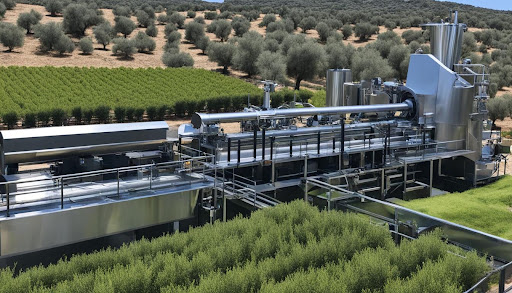
In the end, how olive oil is made, what it's made from, and what's in it make it unlike seed oils. Its special way of production and nutrition, especially the healthy fats and extras like antioxidants, make it very different. Knowing these differences helps you see the value and benefits of choosing olive oil.
Nutritional Insights: Olive Oil Benefits for Health and Cooking
Olive oil is not only good for cooking but also for your health. It's a major part of the Mediterranean diet, known for its many good effects on health. Let’s look into how olive oil can help keep us healthy.
Mediterranean Diet and Olive Oil's Key Position
The Mediterranean diet includes lots of fruits, veggies, and olive oil. This way of eating has many health advantages. It's shown to lower heart disease risk, lessen cancer chances, and boost brainpower.
Olive oil is a big deal in this diet because it is full of monounsaturated fats and antioxidants. These substances are good for our hearts, fighting off bad cholesterol and inflammation.
Adding olive oil to our daily meals is a smart move. It lets us enjoy the benefits of a diet that is great for the heart and filled with healthy fats.
Olive Oil: A Source of Healthy Monounsaturated Fats
Olive oil is packed with monounsaturated fats, which are good for our hearts and overall health. These fats lower heart disease risks by enhancing cholesterol, cutting blood pressure, and fighting inflammation.
Unlike bad fats in many processed foods, these monounsaturated fats are in the healthy category. They are an important part of eating well.
Using olive oil in your cooking in reasonable amounts is a wise choice. It adds health benefits and a tasty touch to your meals.
Benefits of Olive Oil for Skin Health
Olive oil doesn’t just help our insides; it’s also great for our skin. It’s a natural moisturizer that nourishes and protects our skin.
It fights free radicals, which slows down aging. It also calms irritated skin, thanks to its anti-inflammatory qualities.
Add a little olive oil to your skin care routine. It will help keep your skin soft, smooth, and glowing.
Cooking Temperatures and Olive Oil Stability
When using oils for cooking, we must think about how they react to heat. Olive oil handles heat well, making it good for sautéing, baking, and light frying.
The oil’s ability to do well under heat comes from its high monounsaturated fat content. These fats resist harmful changes when heated.
Using olive oil at the right heat keeps its quality and benefits. For the best results, use it with lower to medium heat cooking.

Olive oil is a powerhouse of nutritional benefits for our health and happiness. Its use in the Mediterranean diet, packed with good fats, skin health benefits, and cooking versatility make it truly special. Adding olive oil to our daily life improves our health and culinary adventures.
A Closer Look at Seed Oils: Types, Uses, and Nutrition
In this part, we're diving into the world of seed oils. They come from plant seeds and are popular in cooking for their many uses and nutrition. We'll look at the kinds of seed oils, how they're used in cooking, and what they offer for our health.
Types of Seed Oils:
- Sunflower oil: Comes from sunflower seeds and has a light taste. It's good for cooking because it can handle high heat well.
- Sesame oil: Used a lot in Asian dishes for its rich, nutty flavor. Great for stir-fries and as a topping.
- Flaxseed oil: Full of omega-3 fatty acids for heart health. Often used in dressings and smoothies.
- Canola oil: With a neutral taste and a high smoke point, it's perfect for cooking and baking.
- Grapeseed oil: Light in taste, it's ideal for salads, marinades, and quick cooking methods like sautéing.
Uses in Cooking:
Seed oils work well in lots of cooking ways, from frying to baking. They can handle high heat and have mild flavors. This helps you make your food just the way you like.
Nutritional Profile:
These oils are rich in healthy fats like mono and polyunsaturated fats. They're better for you than the bad fats. Plus, they have omega-3 and omega-6, which are key for your heart and fighting inflammation.
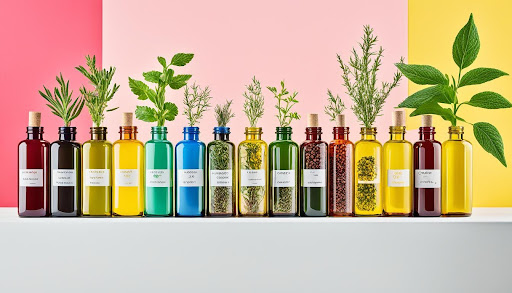
"Seed oils are a flavorful and nutritious addition to any kitchen. By exploring the different types, you can find the perfect oil to enhance the taste and health benefits of your favorite recipes."
After this section, you'll know more about seed oils. You'll understand their variety, cooking uses, and the nutrition they bring to the table.
Olive Oil's Role in a Balanced Diet
Using olive oil daily can boost your health in many ways. This oil is not just healthy but also adds great flavor to food.
Incorporating Olive Oil into Daily Nutrition
There are many ways to blend olive oil into your meals. You can use it in salads, on veggies, or as a healthier cooking oil.
- Use olive oil in salads or on roasted veggies for a tasty, nutritious choice.
- Mix it into marinades to make your meals more delicious.
- Create a healthy dressing by mixing olive oil with vinegar or lemon juice.
- Use olive oil instead of butter when cooking to cut down on unhealthy fats.
What's great is you can improve your diet and food's taste at the same time by using olive oil.
Comparing Olive Oil with Other Healthy Cooking Oils
When picking cooking oils, olive oil is a top pick for health. It's better than oils like corn oil or canola oil for several reasons:
- The monounsaturated fats in olive oil are good for the heart and can lower heart disease risk.
- Olive oil fights inflammation, which is good for your health overall.
- It can be heated to higher temperatures before smoking, so it's great for different kinds of cooking.
Olive oil is clearly the healthiest choice when it comes to cooking and preparing food.
Olive Oil's Contribution to Heart Health
Our heart's health is key to our overall well-being, and olive oil helps a lot in this area. It can lower "bad" cholesterol levels while raising "good" cholesterol.
Olive oil also has antioxidants. These can lessen inflammation and stress on the heart, making it healthier. Using it in your diet supports a strong heart.
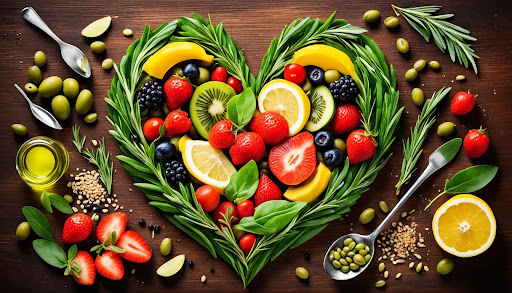
So far, we've seen how vital olive oil is for a healthy diet. It can help you cook better and supports your heart. The next part will dive deeper into how it and other oils affect our health, which will help you make smarter choices.
Olive Oil vs. Seed Oil: A Deep Dive into Health Impacts
In this section, we'll explore how olive oil and seed oil affect our health. It's vital to know what we're putting into our bodies. We'll cover how these oils impact our well-being in detail.
Olive oil is great for the heart, as many studies have shown. It can lower the risk of heart issues and strokes. This is because it's full of healthy fats, which reduce bad cholesterol, shrink inflammation, and make our blood vessels work better.
Seed oils might not be as kind to our hearts. Oils like soybean and corn are high in omega-6 fats. Too much of these fats can lead to more inflammation, possibly causing diseases over time.
It's also important to think about what else these oils bring to our diet. Olive oil is packed with antioxidants and beneficial elements like polyphenols. These fight off inflammation and help our bodies repair themselves.
But, seed oils might not have as much of these good-for-you parts. This means they might not offer the same level of health benefits.
Now, let's see how olive oil and seed oil compare health-wise with a table:
| Olive Oil | Seed Oil | |
Cardiovascular Health | Can help reduce LDL cholesterol levels, lower inflammation, and improve blood vessel function | May promote inflammation when consumed in excess |
Antioxidant Content | Rich in antioxidants and beneficial compounds like polyphenols | May have a lower concentration of antioxidants and beneficial compounds |
This table shows olive oil provides unique health perks versus seed oils. Yet, mixing both in our diets is smart. Balance is crucial for getting all the necessary nutrients.
In wrapping up, it’s clear that olive oil is good for our heart and body. But, getting advice from experts is always wise. They can help pick the best oils for our personal health.
Conclusion
After learning about this topic, we find that olive oil is unique from seed oil. They both fit under the vegetable oils group but come from different plants. Olive oil comes from olives, the fruit of the olive tree. Seed oils, on the other hand, are from various plant seeds.
Olive oil is known for its healthy fat content. It mainly has monounsaturated fats which are good for the heart. In comparison, seed oils can have various fats, even less healthy ones like saturated fats.
Olive oil holds a key place in the healthy Mediterranean diet. This diet is praised for its good effects on the heart and whole body. Olive oil can help with heart health, less inflammation, and good skin. It’s also a great choice for cooking because it doesn’t easily break down from heat.
In short, olive oil is not a seed oil but a great and special kind of oil. Adding it to your meals can boost your health. Make sure to pick extra virgin olive oil for the most benefits.